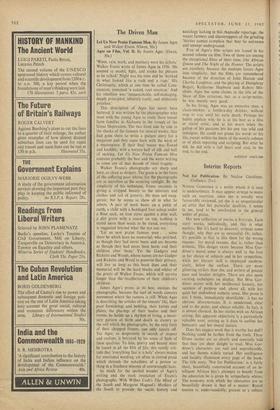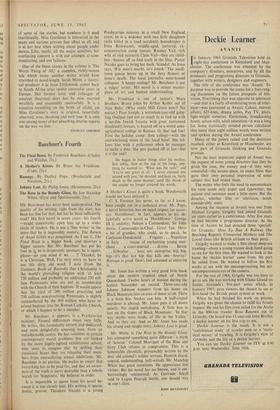Interim Reports
Not for Publication. By Nadine Gordirner. (Gollancz, 21s.) NADINE GORDIMER is a writer whom it is easy to underestimate. It may appear strange to make such an assertion, since she is usually very favourably reviewed, yet she is so unspectacular an artist that her particular qualities, it seems to me, tend to be overlooked in the general welter of praise.
Her new collection of stories is first-sate. Each story works, individually, and this is what matters. But it's hard to discover, without some thought, why they are so successful. Or, rather, it's possible at first to like them for the wrong reasons: for moral reasons, that is, rather than esthetic. This danger exists because Miss Gor- dimer's moral sense is always well to the fore in her choice of subjects and in her sympathies, while her literary skill is employed unobtru- sively, below the surface.. There are more glittering stylists than she, and writers of greater pace and headier delights. There are also more exciting techniques on display. But Miss Gor- dimer scores with her intellectual honesty, her sureness of purpose and, above all, with her quiet but undoubted esthetic sense. Her prose is not, I think, immediately identifiable: it has no obvious idiosyncrasies. It is unadorned, clear and to the point, and always reliable. In fact, it is almost classical. In her stories with an African setting, this apparent objectivity is a particularly valuable asset, serving as it does to outline her humanity and her moral stature.
Does this suggest work that is worthy but dull? Nothing could be farther from the truth. These fifteen stories are so clearly and concisely told that they are sheer delight to read. Miss Gor- dimer's characters are real and unpredictable, and her themes widely varied. Her intelligence and lucidity illuminate every page of the book. The title story, 'Not for Publication,' is a fairly short, beautifully constructed account of an in- telligent African boy's attempts to benefit from the education he is given by sympathetic whites. The economy with which the characters are so beautifully drawn is that of a master. Racial tension is, understandably, present as a subject of some of the stories; but nowhere is it used inartistically. Miss Gordimer is interested in the many and various stresses that affect us all, and is at her best when writing about people under duress. Like, surely, all the major novelists, her continuing concern is with our attempts at com- municating, and our failures.
One of the finest stories in the volume is 'The Worst Thing of All,' a complex, richly-woven tale which many another writer would have stretched to novel-length. Sarah Mann, a theatri- cal producer ci la Joan Littlewood, comes back to South Africa after twelve successful years in Europe. Her former lover and colleague of amateur theatrical days has by now married wealthily and reasonably successfully It is a situation trembling on the brink of clich6, yet Miss Gordimer's story is original, beautifully observed, wise, shocking and very true. It is only one among many of her absorbing interim reports on the way we live.
CHARLES OSBORNE



































 Previous page
Previous page